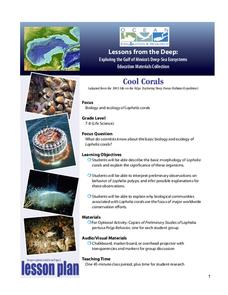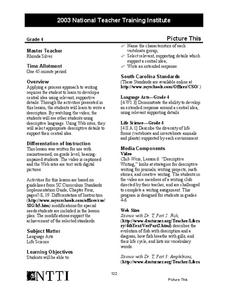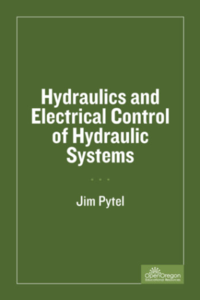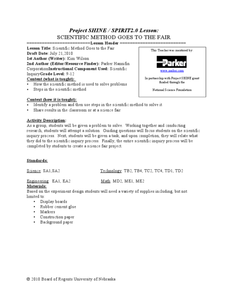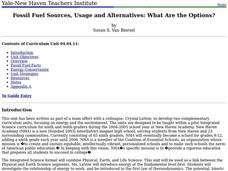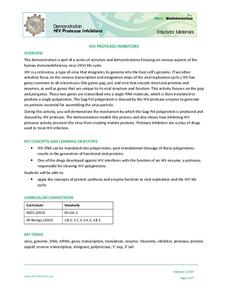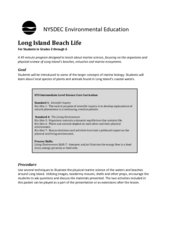NOAA
Currents
Learn how ocean currents are vital to humans and marine life. The eighth installment of a 23-part NOAA Enrichment in Marine sciences and Oceanography (NEMO) program, focuses on ocean currents and how they affect global climate. The...
Curated OER
Call to Arms: Robotic Analogues for Human Structures
Investigate deep sea discovery through the emerging technology being built. In this physical science instructional activity, young scholars analyze the different types of motion available in the human arm. Students research educational...
NOAA
Deep-Sea Ecosystems – Cool Corals
Young oceanographers research deep sea corals that thrive on chemosynthesis. The lesson focuses on the biology of the animal, preferred habitat, associations, and interactions.
Curated OER
Write a Description
Finding the central idea is the focus of this lesson plan. Middle schoolers write descriptions of different animals using details and descriptive language. They watch a video of kids using descriptive language, and then use showing...
Curated OER
Design a Reef!
Using a miniature coral reef aquarium kit, young ecologists model this unique ecosystem. They research various coral reef organisms and their niches, and they culminate the project by working together to write a report. Use this activity...
Curated OER
My Wet Robot
After hearing about the 2006 PHAEDRA mission that explored the Aegean Sea, middle schoolers work in groups to create a robotic vehicle. They must consider power, propulsion, and other vital systems. Use the multitude of external...
NOAA
Biological Oceanographic Investigations – Keep Away
As of 2015, there are 53,481 oil wells in the Gulf of Mexico. Scholars determine how species diversity is impacted based on the ecosystem's distance from a drilling platform. It focuses on finding the mean of data sets and creating bar...
Open Oregon Educational Resources
Hydraulics and Electrical Control of Hydraulic Systems
It's all systems go for learning about hydraulic systems. An eBook provides a set of videos and exercise questions for a semester-long course on hydraulics. Six units introduce hydraulics, Pascal's law, hydraulic applications, flow...
Curated OER
The Roving Robotic Chemist
Junior oceanographers and underwater geologists describe the four major steps of mass spectrometry. They compete in small groups to simulate the tracking of a deepwater methane plume using imaginary autonomous underwater vehicles. Give...
NASA
Is It Alive?
Determining whether or not something is living can be more difficult than it seems. Put your young scientists to work defining their own criteria to identify life, then work with three samples to see if they are alive or not.
Curated OER
Scientific Method Goes to the Fair
Learners use scientific process skills to solve a problem. In this scientific investigation lesson, students investigate a scientific problem, work through the scientific method to form a conclusion. They share their work and findings...
Curated OER
Fossil Fuel Sources, Usage and Alternatives: What are the Options?
Young scholars identify the different sources of fossil fuels. In this environmental science lesson, students research about how these impact our environment. They explore renewable energy sources that could replace fossil fuels.
Virginia Department of Education
Prokaryotes
Lead your biology class on a cell-sized adventure! Emerging scientists construct models of prokaryotes, then design an experiment to properly grow a bacterial culture. They conclude the activity by viewing the culture under a microscope....
Curated OER
The Sounds of Science
Students assess the relationship between music and science by learning how various musical instruments work. They create a poster, presenting the research conducted in class that focuses on a specific musical instrument.
Curated OER
Into a New Millennium, Lesson 4: 1970 to Present
Students view different slides on how agriculture has changed in America. In groups, they are given one resource to read and answer discussion quesions. After reviewing answers, they participate in different scenerios to help protect...
Exploratorium
Hot Spot
Not only does a concave mirror focus light waves, it can also concentrate infrared radiation into a hot spot. If you have a small electric heater and such a mirror, demonstrate this for your physical science class.
Curated OER
Hurricane Happenings
Fourth and fifth graders engage in this impressive lesson which focuses on the causes of hurricanes and tropical storms. The use of video clips and Internet sites helps facilitate discussion amongst pupils which should lead them to a...
Curated OER
Sizing Up The Solar System
Students investigate and design various models of size and distance related to the solar system. They work together to build a solar system model. The models should focus on distance and scale. They don't include moons or satellites in...
Howard Hughes Medical Institute
HIV Protease Inhibitors
How do doctors fight a virus that's constantly mutating? Show science scholars how we fight HIV using one of its own most fundamental processes through a thoughtful demonstration. The lesson focuses on how protease inhibitors prevent HIV...
NOAA
Ocean Exploration
Where am I? The second installment of a 23-part NOAA Enrichment in Marine sciences and Oceanography (NEMO) program starts with pupils guessing the years in which major ocean exploration events took place. The instructional activity then...
Curated OER
Human Cheek Cell
Get up close and personal with human cells with this lab worksheet. Learners use a microscope to examine their own cheek cells, drawing diagrams of the cells and identifying the parts when they have focused in on a visible specimen....
NOAA
The Biggest Plates on Earth
The deepest part of the ocean is the Marianas trench where two tectonic plates meet. Scholars explore plate tectonics and their boundary types by completing hands-on activities throughout the lesson. Specific areas, such as the Galapagos...
Ocean Explorer
Architects of the Coral Reef
Coral Reefs are the focus of a life science lesson plan. Upper graders look at how coral reefs are formed, how the animals and plants reproduce, and the variety of ways that humans benefit from coral reefs around the world. Groups of...
Curated OER
Long Island Beach Life
Have your class learn about marine life through this resource. This comprehensive lesson has learners discuss marine life, learn key vocabulary, discuss environmental concerns, and play games related to migration and predator/prey...




